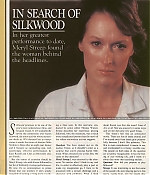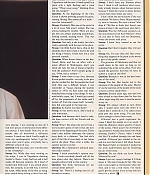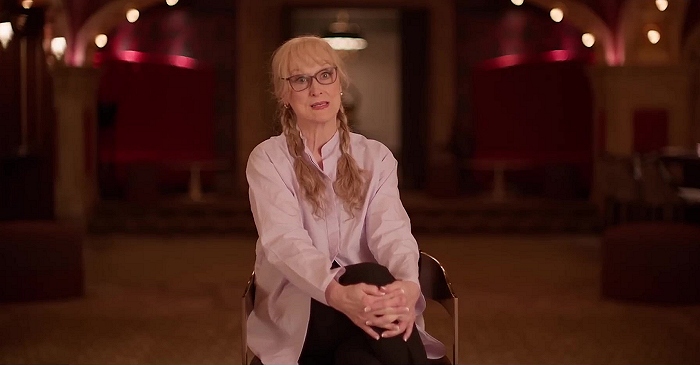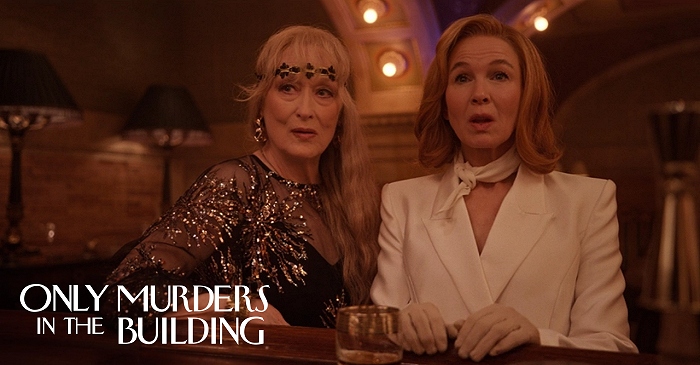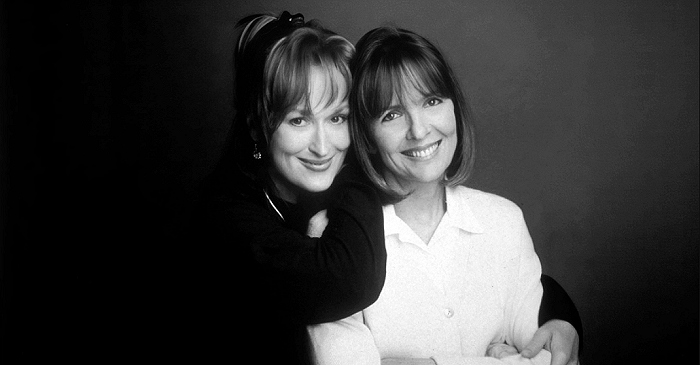|
Simply Streep is your premiere online resource on Meryl Streep's work on film, television and in the theatre - a career that has won her acclaim to be one of the world's greatest living actresses. Created in 1999, Simply Streep has built an extensive collection over the past 25 years to discover Miss Streep's body of work through thousands of photographs, articles and video clips. Enjoy your stay and check back soon.
|
|
In Search of Silkwood
American Film ·
December 1983
| ||
|
Tags
|

“Silkwood” promises to be one of the year’s most talked-about films, and for good reason. It will undoubtley receive the controvery over Karen Silkwood, the union activitist whose mysterious death in 1974 elevated her to martyr status; it marks the return of director Mike Nichols to films after an eight-year-hiatus; and it features an outstanding cast, with surprisingly effective performances by Kurt Russell and Cher as Silkwood’s closest friends. But the center of attention should be Meryl Streep, who adds Karen Silkwood to her list of brilliantly riveting performances. By now, it’s so commonplace to praise Streep that one wonders if she’s simply incabable of making a wrong move or striking a false note. In this Interview, conducted by senior editor Thomas Wiener, Streep describes her experience playing Silkwood, who, she maintains, was a much more complicated person than the myth of the valiant antinuclear activitist suggests.
American Film: You have spoken out on the nuclear freeze, so it shouldn’t come as a surprise that you’re playing Karen Silkwood. What attracted you to this film, the cause or the character?
Meryl Streep: I was attracted to the character. No matter what I think in my real life, in order to effectively play a part or make my imagination go, I have to be presented with a certain challenge and a character with problems. What I liked about Karen was that she wasn’t Joan of Arc at all. She was unsavory in some ways and yet she did some very good things. This doesn’t feel like an antinuclear movie. There are lots of those around, and I’ve stayed away from them quite purposefully because I don’t like polemics. This film is more complicated, it seems to be, and evenhanded in a funny, real-life way. The people on both sides of the question are all pretty recognizable. It has the feeling of real working life, and I think it’s about that more than anything nuclear.
How did you prepare to play Silkwood?
It was interesting to me that some of the people who were playing party in this movie, mainly Kurt, met the people they were playing. I was meeting no one; all I had were pieces of information from different pieces of information from different sources. I had details from five or six people that all described a different woman. It made me think I really ought to write my autobiography before I go, because once you’re gone, everybody has a different version of you.
Did you make any contributions to the screenplay?
No. While they were working on the script, I was in Yugoslavia, shooting “Sophie’s Choice”, I only had two and a half weeks off between projects. So I kind of backed into “Silkwood”. I was afraid about that, but actually, in an odd way, it served the script. Mike spoke of the film as being about people being asleep in their lives and waking up: “How did I get here?” And that’s exactly how I felt. One day I was in Yugoslavia and the next I found myself in a plant with a light flashing and a siren going, “Woop woop woop,” thinking, How did this happen?
At the beginning of the film, Karen is shown prowling around the plant, teasing, flirting. She comes off as a kook – was that intentional?
Absolutely. She was on the prowl in a lot of ways. She wasn’t settled. She was always looking for trouble. There are people who are always exploring possibilities, looking around, making waves. That was the way she seemed to me.
Not only is she kooky, but she’s cocky, especially with the men in the plant.
I do think Karen had a chip on her shoulder, but I don’t think it had to do with her being a woman. I think hers was a very personal crusade.
When Karen cheats on her boyfriend, Drew, and has an affair with a union official in Washington, don’t you think she runs the risk of losing symphathy with the audience? Aren’t people going to say, “Now, wait a minute…”
I want them to say that, because Karen spelled trouble – not only to the people she worked for, but the people she lived with. She was a difficult person. I can remember at Vassar, during the student strikes in 1970, we had some real loud-mouthered boys trying to run things. It was a worthwile cause, but I would get turned off by the proponents of the strike and I turned off from the cause itself. Actually, they did some good in the long run.
So Karen was like them?
In this movie she is. She’s hard to take sometimes.
And because she’s hard to take, she loses contact with her friends and co-workers.
What I like about the movie from a moviemaker’s point of view is that she isn’t isolated in the beginning of the story. There aren’t nine million close-ups: the camera stays back, at a distance. You feel she’s part of the life of everybody in her house and in her plant. Then, after a while, the camera moves on her.
Does a filmmaker’s political opinion really matter?
I think everybody’s opinion matters. I think everybody should talk all the time about what they believe. There’s not enough political talk in this country.
You think Americans are too cynical about politics?
Yes. There’s a feeling that it’s all beyond us anyway.
Can a movie of Karen Silkwood’s story make a dent in that attitude?
I don’t have any illusions about that. I think it will reinforce what everybody already knows, about human nature, because I think the movie is about human nature more than about any issue. I don’t think the movie knows if she was murdered. We have a Perry Mason mentality here in America. We want to know “who done it.” We like to think that there’s one person sitting in the courtroom who did it.
Was the Silkwood company under any pressure from Kerr-McGee? After all, you shot in Texas and not Oklahoma, where the events took place.
I know they wanted to see the script.
But I don’t imagine they ever got to.
Oh, I’m sure they did. But everything that happens in the plant in the movie is part of the public record. The governor of Oklahoma said that we could shoot in his state as long as we submitted the script to his office. Now why should the governor feel that we have to submit a script of this film?
Because it was in the best interest of the state?
You bet. Bu maybe not in the interest of the people of the state. Maybe it’s in the interests of the people of the state to have a movie made there.
Several years ago, you said you were afraid to turn down jobs for fear the offers might stop. By now, it must be easier to say no.
I’m always afraid to turn down jobs. I would never turn one down if it looked like I could do it. I’ve taken every good part that came along. I’ve just been lucky enough to have them coma. “Silkwood” was a good experience because I liked the people on it so much. I liked the elliptical, elusive quality of many of the scenes. There wasn’t the overwhelming catharis I would come home with from shooting “Sophie’s Choice”, when I would feel like I’d walked through fire and been purified. “Silkwood” just resided in the air, and in a way that’s how I felt about Karen. She floated there; at moments I picked up the truth inadvertently just by breathing the air of her story.
Do you think you know Karen Silkwood by now?
I get very creepy feelings if I think about it. My heart breaks for her. She was only twenty-eight or twenty-nine when she died, and it was a real waste. I’m really glad I got the chance to try to step into her shoes for a while.


Posted on October 18th, 2025
|
Posted on October 14th, 2025
|
Posted on October 11th, 2025
|
Posted on September 30th, 2025
|
Posted on September 16th, 2025
|




